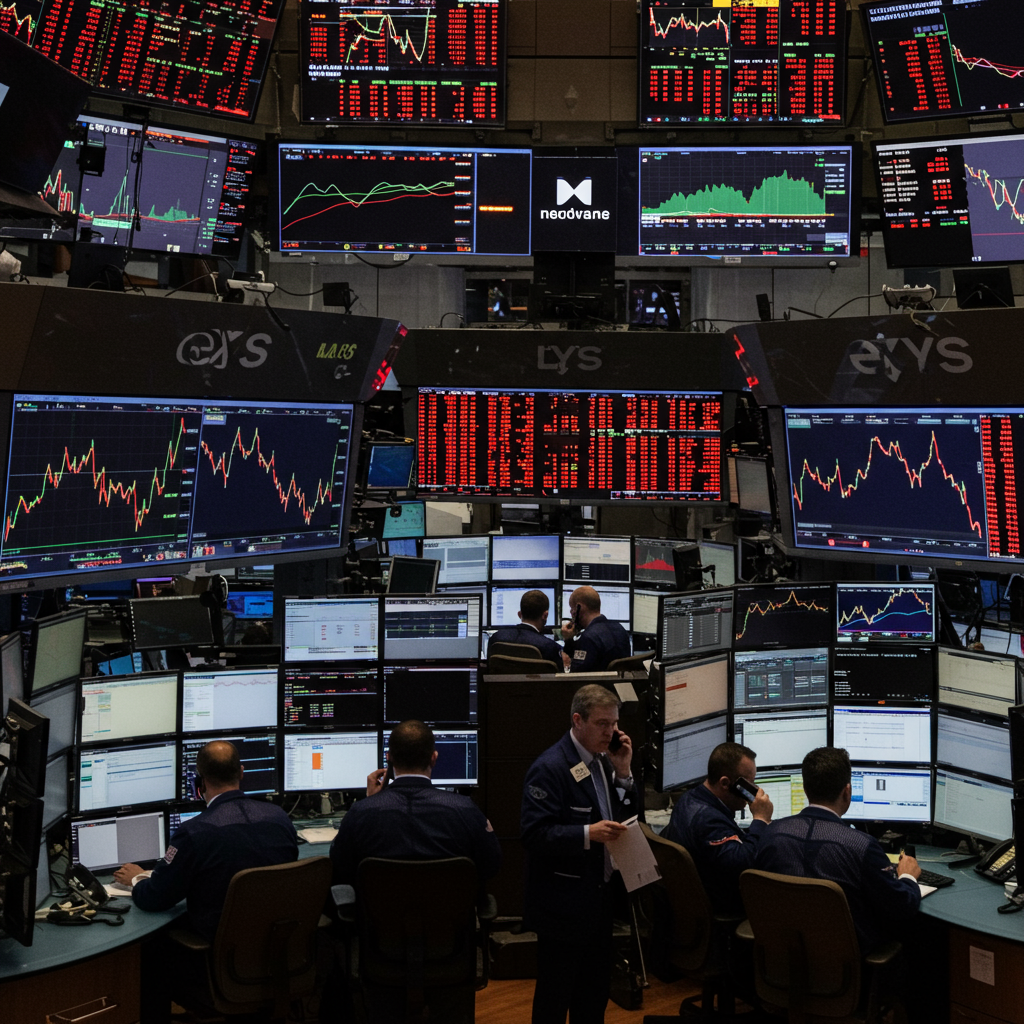Wall Street closed out the week on a cautious note Friday, with the S&P 500 index extending its losing streak to a third consecutive day. Investors grappled with a confluence of factors, including escalating geopolitical tensions in the Middle East and lingering uncertainty surrounding the future path of U.S. interest rate cuts by the Federal Reserve.
The broad market S&P 500 dipped 0.22%, finishing the session at 5,967.84. The tech-focused Nasdaq Composite also closed lower, shedding 0.51% to settle at 19,447.41. Defying the broader trend, the blue-chip Dow Jones Industrial Average managed a modest gain, ticking up 35.16 points, or 0.08%, to close at 42,206.82.
For the week, the S&P 500 posted a small loss of about 0.2%. The Dow eked out a tiny 0.02% gain, while the Nasdaq saw a slight advance of 0.2%.
Key Headwinds for the Market
Market sentiment was heavily influenced by two primary concerns:
- Geopolitical Tensions: Reports of escalating tensions in the Middle East, specifically concerning potential Israeli military actions against Iran and U.S. President Donald Trump weighing potential direct involvement, fueled market jitters. This uncertainty prompted caution among traders, with some hesitant to hold risky assets over the weekend. Sam Stovall, chief investment strategist at CFRA Research, noted the reluctance to “go long over the weekend” given the global uncertainty.
- Federal Reserve Interest Rate Outlook: Conflicting signals from Fed officials and commentary from the President added complexity to the rate cut picture. While Federal Reserve Governor Christopher Waller suggested the possibility of a rate cut as early as July, this contrasted with Fed Chair Jerome Powell’s recent stance emphasizing a “no hurry” approach and data dependence, particularly in light of potential economic impacts from new tariffs. President Trump continued his public criticism of Powell, labeling the Fed Chair as “destructive” and costing the U.S. “hundreds of billions of dollars” by delaying rate cuts.
Sector and Stock Movers
Specific sectors and individual stocks saw notable action driven by earnings, deal news, and industry developments:
Chip Stocks Face Pressure: The semiconductor sector saw declines following a report suggesting the U.S. might revoke waivers allowing some foreign manufacturers access to American technology in China. Major players like Nvidia and Taiwan Semiconductor Manufacturing (TSMC) saw shares fall. The VanEck Semiconductor ETF (SMH) also closed lower.
Building Stocks Boosted by Bidding War: Shares of GMS surged significantly (28%) following reports of a bidding war between QXO and Home Depot for the building products company. This news also provided a lift to other building material stocks like Bluelinx Holdings and Installed Building Products.
Crypto-Related Assets Gain: Enthusiasm for the digital asset space continued with Ether ETFs seeing sustained inflows, marking their sixth consecutive week of positive additions. Shares of Circle climbed sharply following Senate approval of proposed stablecoin legislation (the GENIUS Act), and Coinbase also rose, benefiting from its relationship with Circle’s USDC reserves.
Semiconductor AI Focus Diverges: While some chip stocks faced pressure, investor and analyst attention remains intensely focused on the artificial intelligence segment. Certain companies, like Advanced Micro Devices (AMD), are seen as significant players gaining traction. Analyst sentiment, such as that from Piper Sandler, has been particularly bullish on AMD’s AI advancements, raising price targets and highlighting the potential for growth from new AI chips (like the MI350 and MI400 series) and rack systems. Positive indicators in AMD’s client business also contribute to this optimistic outlook, suggesting strong conviction in certain AI-focused semiconductor firms’ strategic direction and product pipelines, even as the broader sector navigates regulatory uncertainties. In contrast, Arista Networks, despite its role in AI networking, has underperformed this year, with JPMorgan noting that the market may be underappreciating its position relative to competitors.
Earnings Bright Spots: CarMax shares jumped after the used car retailer exceeded first-quarter earnings expectations. Darden Restaurants (parent of Olive Garden) also saw its stock rise on a top and bottom-line beat for its fourth quarter.
Analyst Commentary: JPMorgan reiterated an overweight rating on Cisco, projecting potential valuation increases driven by security transformation and networking upgrade cycles.
Tesla’s Robotaxi Plans: Shares of Tesla rose ahead of the planned pilot launch of its robotaxi service in Austin, Texas, though a group of Texas lawmakers requested a delay until new regulations take effect in September 2025 for public safety reasons.
Broader Economic and Sentiment Indicators
Several economic data points and sentiment surveys painted a mixed picture:
Weak Manufacturing: The Philadelphia Federal Reserve’s manufacturing business outlook for June came in weaker than expected at -4, indicating continued soft activity in the region with declines noted in new orders, shipments, and employment.
Rising Bearish Sentiment: The latest AAII survey showed a notable spike in bearish sentiment among individual investors, rising to 41.4% from 33.6% the previous week, moving significantly above the historical average. Bullish sentiment declined, remaining below its historical average for the 18th time in 19 weeks, reflecting increased caution.
Swiss Rate Cut: The Swiss National Bank cut its key borrowing rate to zero, countering lower inflationary pressure and opening the door to potential negative real rates in Europe again.
Weak UK Retail Sales: Retail sales volumes in the United Kingdom saw a surprisingly large decline in May, falling 2.7%, steeper than economist forecasts.
Mixed Asia: Markets in Asia-Pacific traded mixed, with Hong Kong and South Korea higher, while Japan and Australia saw declines. China kept its benchmark rates steady.
Amidst a backdrop of geopolitical uncertainty and nuanced economic signals, investors continued to calibrate expectations, contributing to the market’s volatile close to the week.


